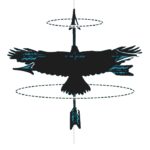Martin Ott is the author of nine books of poetry and fiction, including “Underdays” (University of Notre Dame Press, 2015), Sandeen Prize Winner and Forward Indies Finalist. His newest book, “Fake News Poems” (BlazeVOX Books, 2019), takes the headline of a news story from each week as a jumping off point to explore political and personal turmoil in the first year of Trump’s presidency. His work has appeared in twenty anthologies and more than two hundred magazines, including Antioch Review, Epoch, Harvard Review, North American Review, Prairie Schooner, and Zyzzyva.
 Artwork by: Louis
Artwork by: Louis
